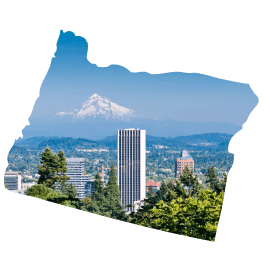Professional Development: Oregon
Retaining Effective Teachers Policy
Analysis of Oregon's policies
Oregon requires that teachers discuss the results of their evaluations in "post-evaluation interviews." The state does not specify that professional development activities must be aligned with findings from teacher evaluations.
Recommendations for Oregon
Ensure that professional development is aligned with findings from teachers' evaluations.
Professional development that is not informed by evaluation results may be of little value to teachers' professional growth and aim of increasing their effectiveness in the classroom. Oregon should ensure that districts utilize teacher evaluation results in determining professional development needs and activities.
Require that evaluation systems provide teachers with feedback about their performance.
Oregon requires teachers to discuss their evaluation results with the evaluator; it would follow that this discussion would include feedback on identified strengths and areas that need improvement. The state should consider strengthening its language so this is clearly established to ensure that this interview is more than just a discussion of the teacher's ratings.
State response to our analysis
Oregon recognized the factual accuracy of this analysis. The state added that SB 290 from the 2011 legislative session requires that the State Board of Education adopt model core teaching standards by January 2012. Teacher evaluations must use the core teaching standards as a basis for performance evaluation and support the professional growth plans offered to teachers and administrators. The model core teaching standards will provide the foundation for consistent teacher evaluation criteria and teacher professional growth and development throughout a teacher's career.
Oregon also noted that SB 252 provides a grant program to improve student achievement through the collaboration of teachers and administrators to design and implement voluntary approaches to evaluation, career pathways, enhanced professional development and compensation models.
Select another topic
Delivering Well Prepared Teachers
- Admission into Preparation Programs
- Elementary Teacher Preparation
- Elementary Teacher Preparation in Reading Instruction
- Elementary Teacher Preparation in Mathematics
- Middle School Teacher Preparation
- Secondary Teacher Preparation
- Secondary Teacher Preparation in Science
- Secondary Teacher Preparation in Social Studies
- Special Education Teacher Preparation
- Assessing Professional Knowledge
- Student Teaching
- Teacher Preparation Program Accountability
Expanding the Pool of Teachers
Identifying Effective Teachers
- State Data Systems
- Evaluation of Effectiveness
- Frequency of Evaluations
- Tenure
- Licensure Advancement
- Equitable Distribution
Retaining Effective Teachers
Exiting Ineffective Teachers
Research rationale
Much professional development, particularly those that are not aligned to specific feedback from teacher evaluations, has been found to be ineffective. For evidence see M. Garet, "Middle School Mathematics Professional Development Impact Study: Findings After the Second Year of Implementation." Institute of Education Sciences (2011).

